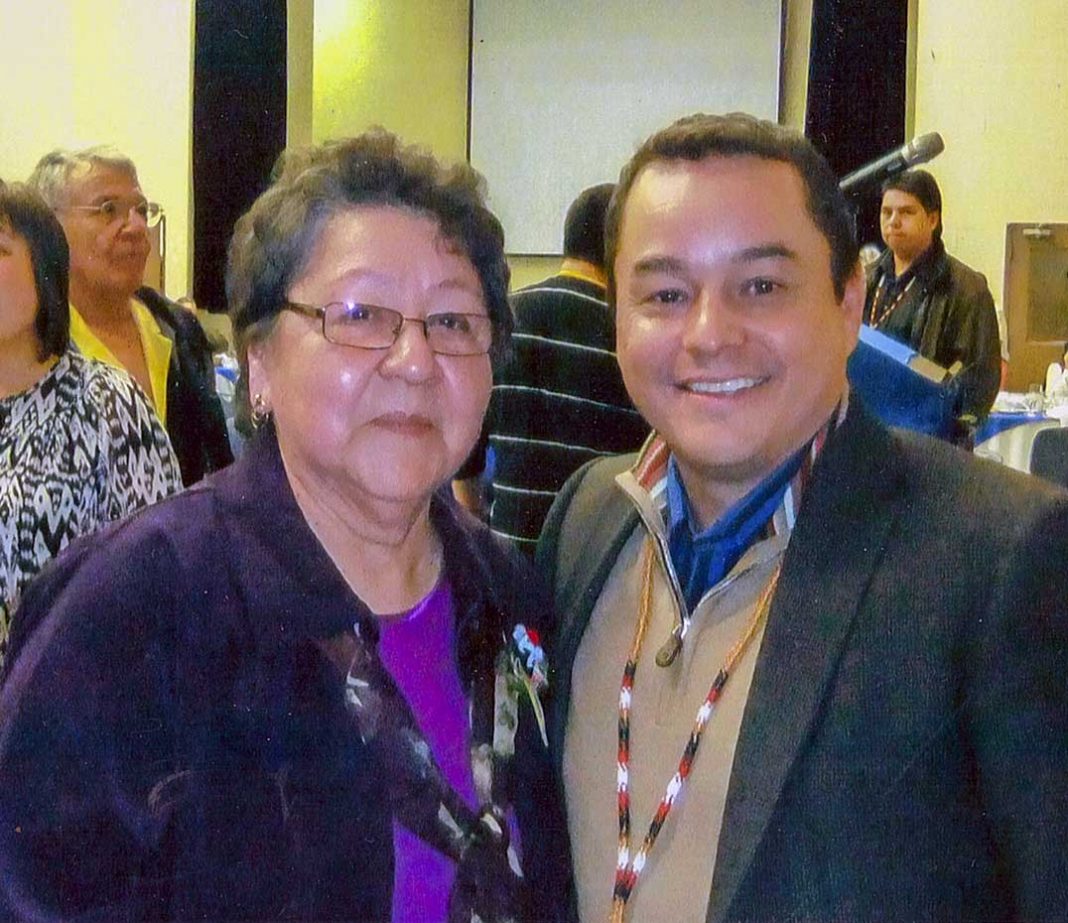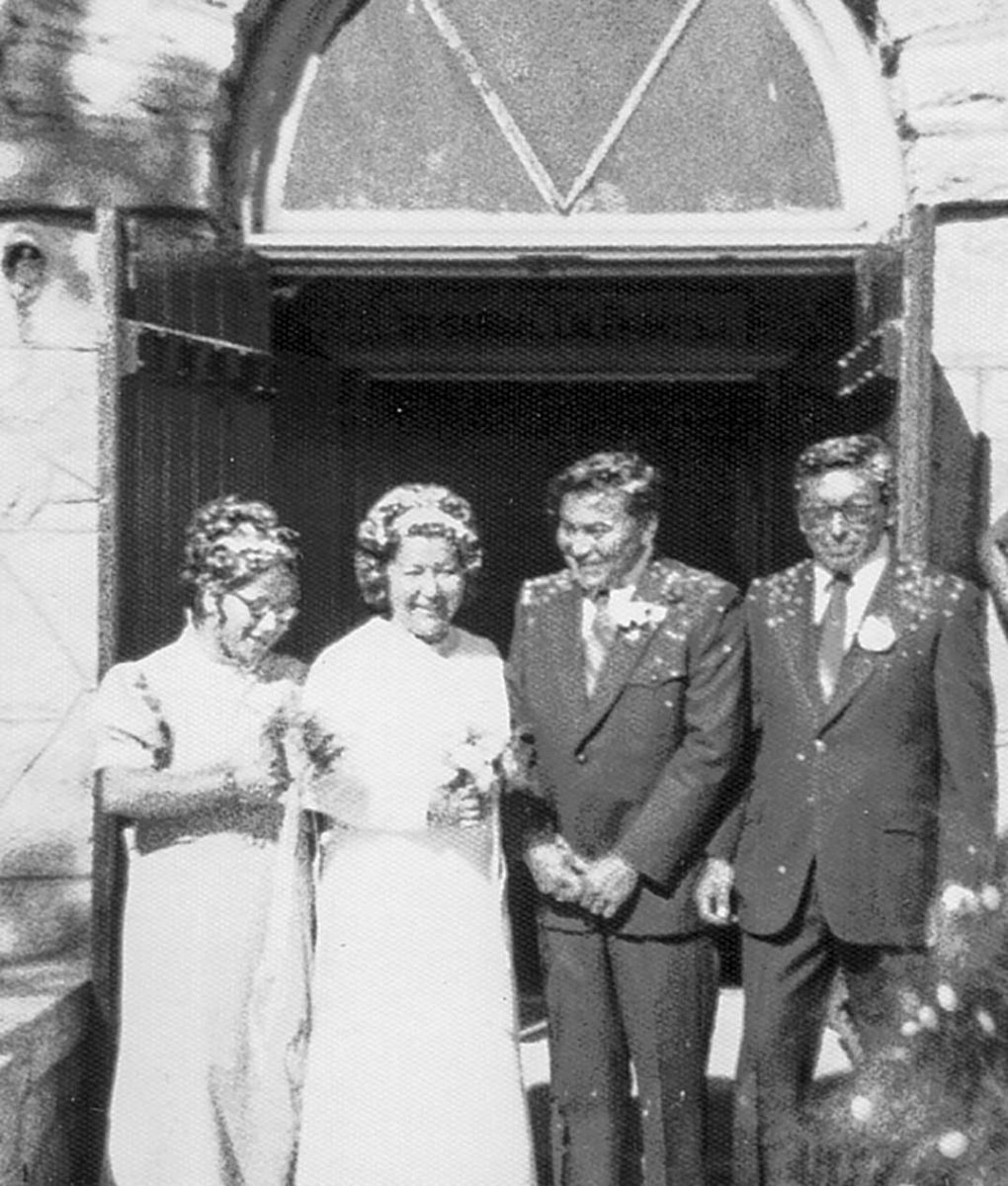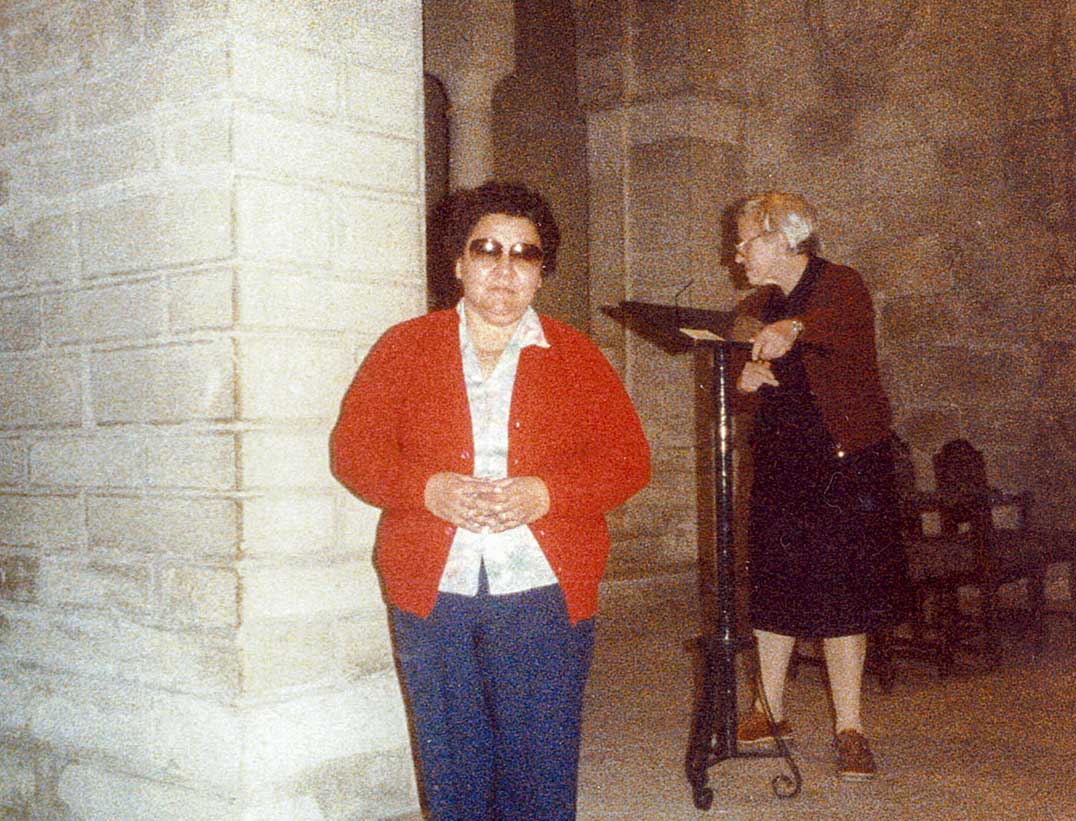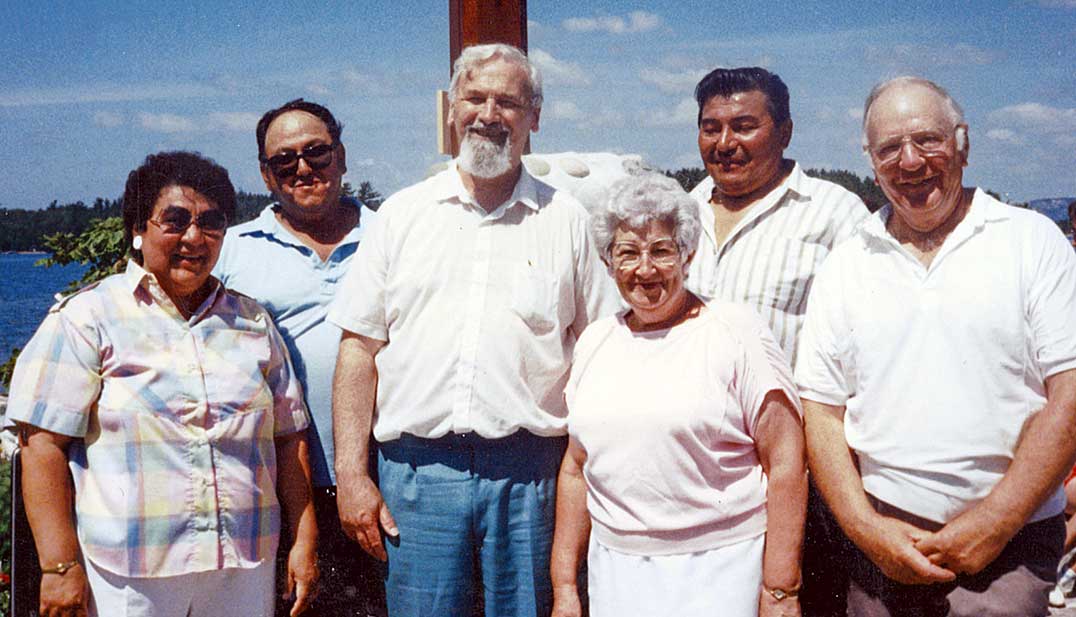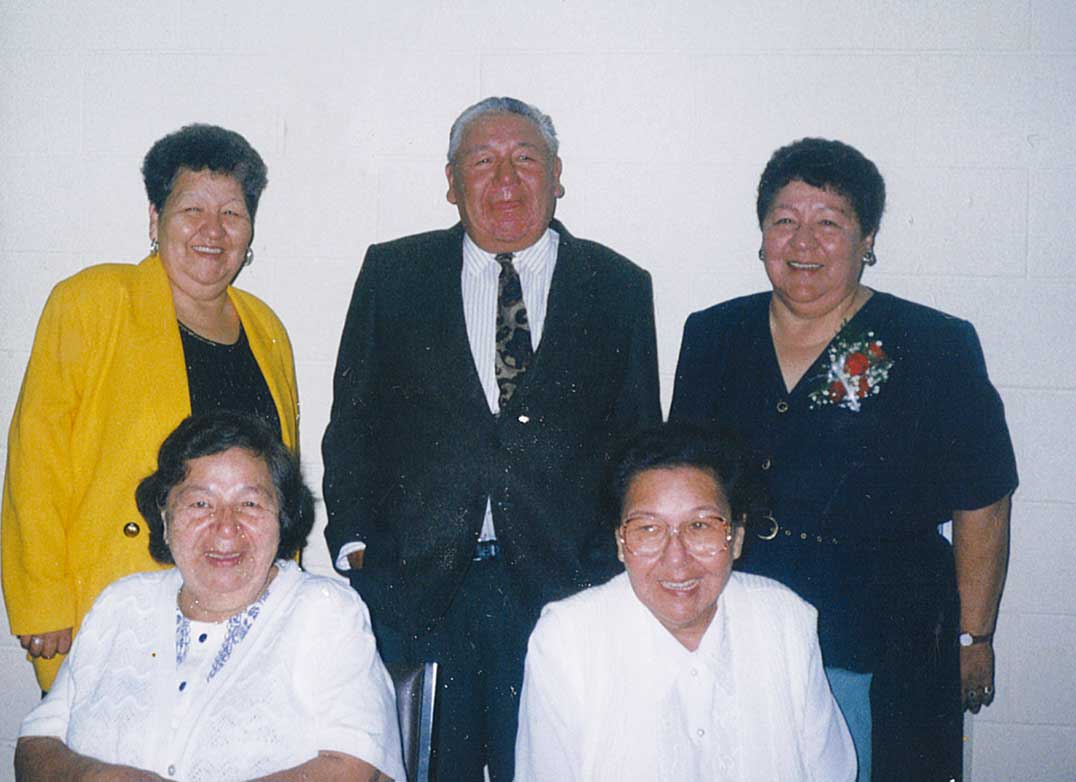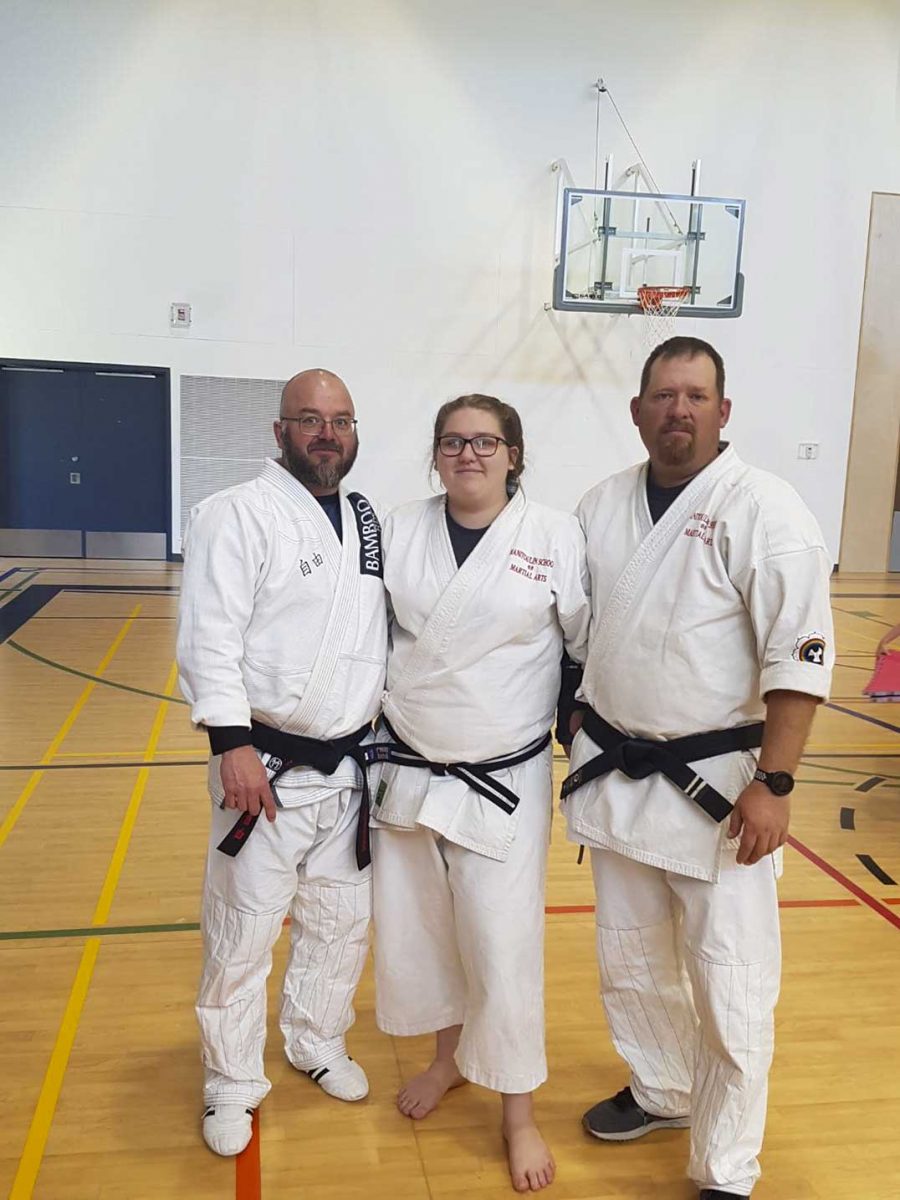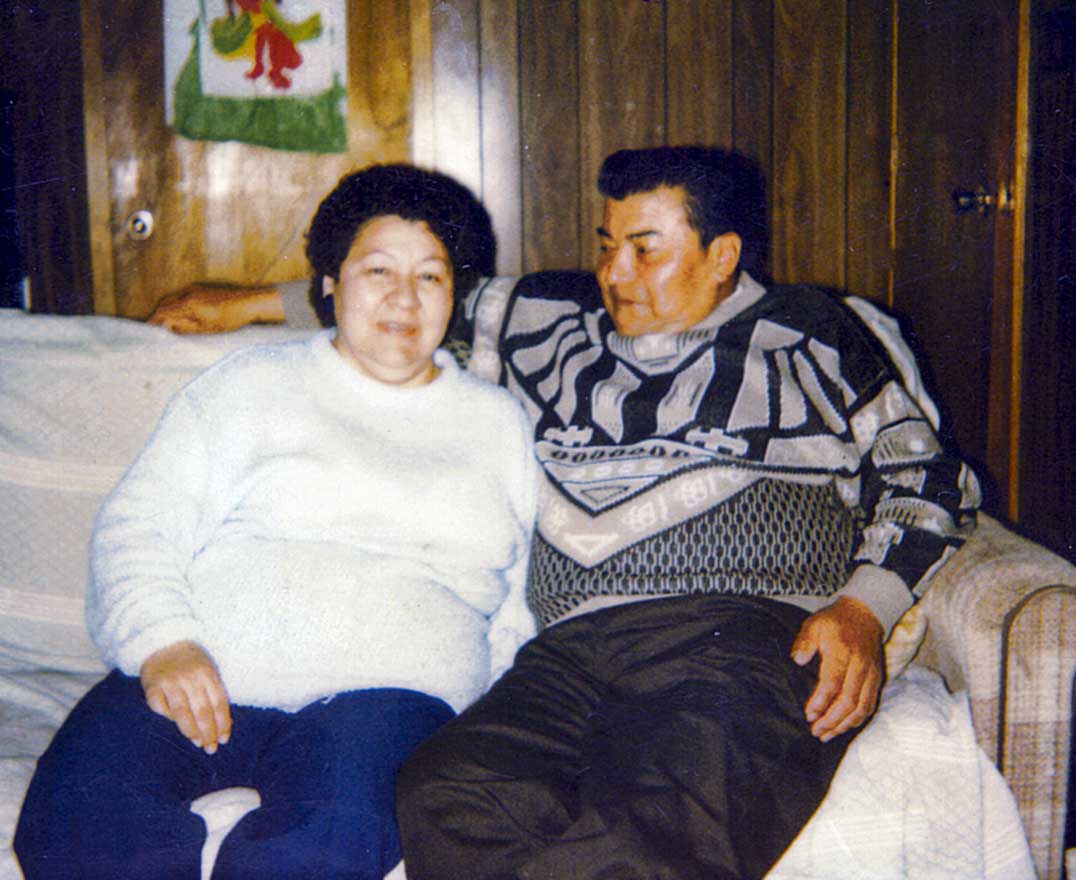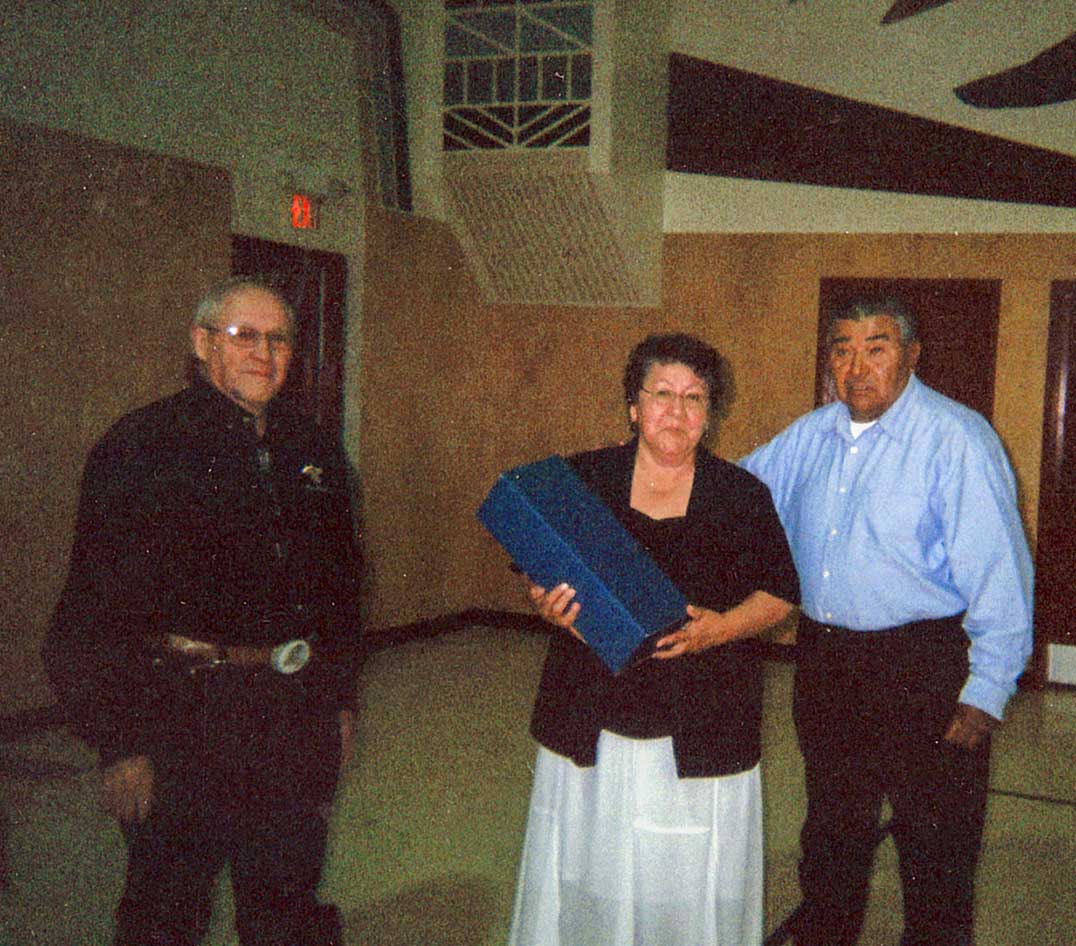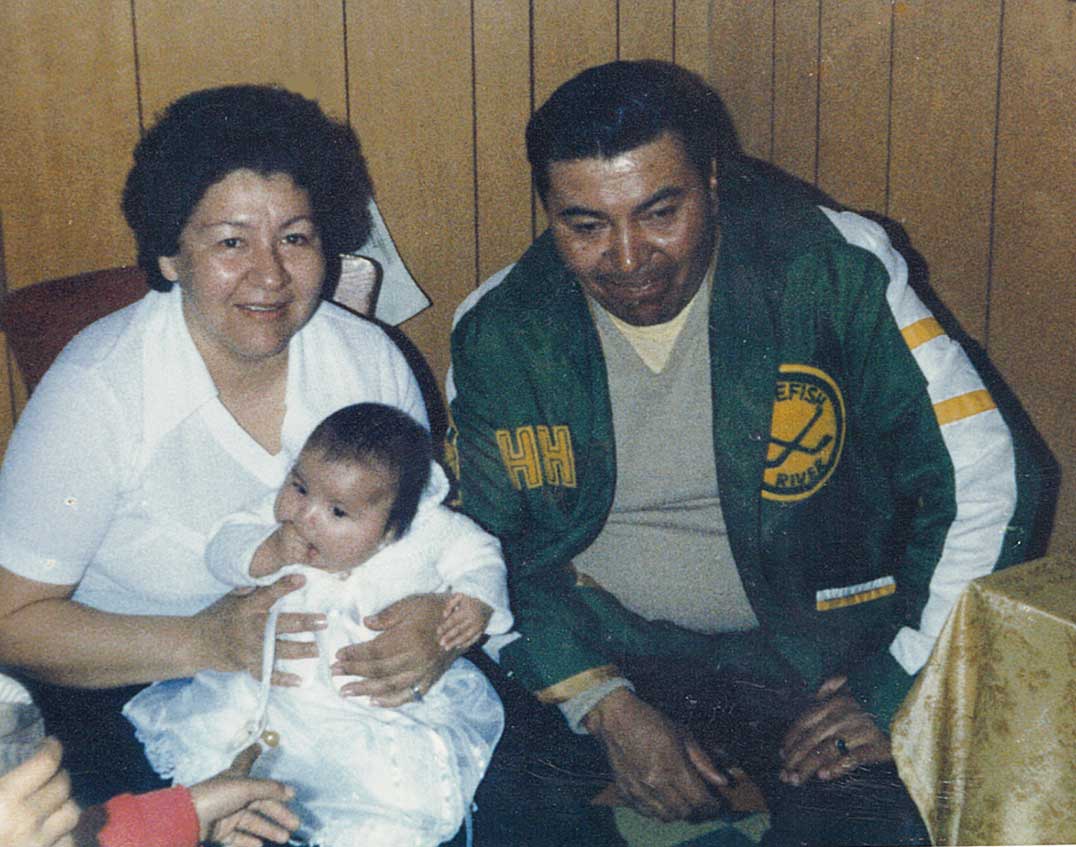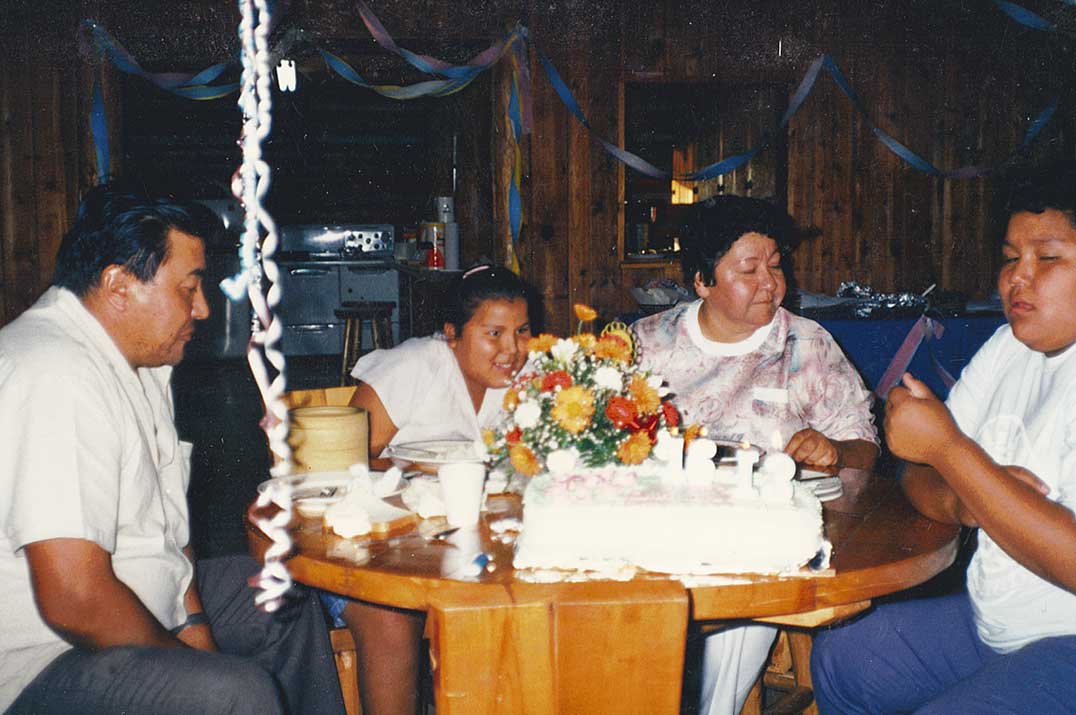Jean McGregor Andrews
Jean McGregor has a strong spiritual presence. She is endowed with a deep sense of appreciation for the vagaries of the human psyche. She gravitates to people who are vulnerable; people who need her special brand of sensitivity and understanding to ‘shine,’ to either move ahead or resolve a difference of opinion. She once successfully calmed down a Mexican hotel manager who was ready for combat with their (trip’s) conveyor and she also soothed an intoxicated person at a school dance. Jean has always volunteered for her community and continues to sit on several committees. She is well-respected and much-admired in her Whitefish River First Nation.
“A great-grandmother on my dad’s side, hailing from Manitoba, is reportedly a cousin of Louis Riel. She spoke French too and dad picked up some French from her. He also had some Scottish customs and an understanding of Spanish along with his Ojibway. My grandfather, Gregor McGregor, was an inspiration to me. He was well-read and travelled a lot to share his knowledge. Ann Arbour University gained from his wisdom and his display of artifacts. These were later returned to the reserve.”
“Grandfather always asked about school while he served us big cookies he had baked. He would share stories and show us his projects. He also helped with the sewing and mending, using a small glass jar to patch socks. Summer people in the area, many from Michigan, kept him busy too. My grandmother, from Sheshegwaning, raised geese and turkeys but she died much earlier than my grandfather.”
Mary Jane (Jean) McGregor Andrews was born on September 11, 1941 to Dave and Louise (Meawasige) McGregor. Mid-wife Mary Jane attended. “I was fine at birth but a little while later I was very sick, and I almost died.” Jean had 10 older siblings: Theodore, Gordon, Oscar, Godfrey, Blanche, Theresa, Helena, Rose, Gerry and Evelyn. Her mother was from Cutler, the Serpent River area.
Theodore, who served in WWII, is buried in Holland. One sister, two years older, had a childhood disease that left her deaf. “I would go to school with her to help her communicate with the other children and the teachers, using sign language. She went to the school for the deaf in Belleville and became sick there, at 16. We brought her home, but she died a little later.”
“My older brothers and sisters were overly protective of me, especially my brothers. There were lots of uncles and aunts around too and we were close. They were like extra parents. When something big happened good or bad, there was always lots of support. Life was good.”
“I went to Indian Day School and found it not unpleasant. We were given things to play with and I remember cutting items from an old catalogue for the teacher. However, if I saw classmates ridiculed or bullied by students or teachers, I would always stand up for them. My brothers had attended earlier and had a less compassionate teacher. One of them came home crying once. I can still see the shirt he had on and his bloodied hands. The teacher had used the metal part of the ruler to hit his hands. My dad got angry. He went to the school and the teachers assured him it wouldn’t happen again. ‘If it does, I will be pulling the kids out of school,’ he responded.
“Godfrey was the only one who went to Residential School on the North Shore. He said it was very foreign. He soon contacted our aunt in Cutler who got hold of our father who got a ride and picked him up. Godfrey never went back.”
“Grandfather would drive us to grandmother’s home area to pick blueberries, which were then sold. The proceeds would buy materials for crafts for the tourists who frequented our area. We always got a treat of ice cream or pop too. Sometimes we would head over to Cutler by canoe and buy some blueberries and fish for a shore lunch. We loved to hear grandfather’s stories too.”
“Our dad would go trapping every fall until Christmas. He also built log cabins and fireplaces. At home, he had his garden and four root-houses. Christmas was a time for celebration for family, gifts and most of all, for father returning safely from his trapline. The furs had been sold in Sudbury and the money used for gifts, food and a turkey. It was an amazing, happy time and we always got something on our Christmas list.”
“One year I found a beautiful chest with some fruit and small trinkets inside, as well as the doll that had also been on my list. I was so happy. After we opened the gifts in the middle of the night, we would run back to bed, leaving the living-room in a big mess. Mother had spent the previous day cooking for the event.” Soon the family would get up and get ready for church. “Dad sang in the choir and my uncle played the organ. They were both self-taught.”
“As the baby in the family, I was often accused of being spoiled. ‘You never get heck,’ they said. Our parents had mellowed a bit by the time they had me, so there were fewer expectations. Mother kept the house and made crafts for sale, using leather, quills and beads. She also quilted and made all our own clothes, all from the blueberry money.”
“Occasionally, she also trapped with father for small game, like rabbits, and helped with the garden. She tended to the cows, chickens, pigs, geese and horses with our help. She was also a crack shot so brought in a few deer. One year I went out with her on the boat and we took our guns in case we found something we could harvest. We didn’t come across any game, but we tested the guns. She hit a small distant branch, but I missed it entirely. ‘Don’t shake so much,’ was her advice.”
High school was in Little Current until Jean left for boarding school after Grade 10. She met girls she liked. They were from other countries in South America and they wanted to learn English. “The sisters punished us for speaking Anishnaabe. After I graduated from high school, I took courses in office administration for two years, in North Bay, working at a nearby lodge in the summer. After I got back home, I started to work at several lodges over time: the old Birch Island Lodge, Camp Hiawatha and Mordolphton Lodge. I made lunches, cleaned cabins and worked in the main lodge.”
“My brother, a nephew and I also worked at a private island for Mr. Burleigh, one of the partners who owned the Greyhound Bus Lines. He would call us one day each spring, and we had to jump into action to clean and ready the cabins for the influx of guests. American visitors arrived first to help host government officials at the facility. Dad had helped build the lodge, so he was well known. We had our own boat to go back and forth and this occasionally created some consternation when there was a shortage of fishing boats.”
Jean next worked for the Ministry of Transportation in Toronto on Bay Street. After two years, her mother got quite sick, and Jean came home where she became Birch Island’s first band administrator. Always interested in furthering her education, Jean also took a specialized native counselling course through O.I.S.E., The Ontario Institute of Studies in Education, part of the University of Toronto.
“I met people like Basil Johnston and Wiikwemkoong’s Cecil King and students from all over the world. Back home, I was offered a training position in Sudbury at Indian Affairs. Clarifying and adding to membership lists became my role. I helped straighten out estate issues and helped match people with their correct names on the government lists. Some people were not sure to which band they belonged. I went to many bands and checked any genealogy information that was available to help with this work.”
Another assignment was the administration of small bands. “I recall getting a call one day, ‘how soon can you be ready to fly from Whitewater Lake in Sudbury?’ I answered, ‘by 3 pm’. ‘Ok, start packing.’ A few of us helped organize the bookkeeping and we stayed only long enough to help negotiate with the bank and get finances organized.”
“On another assignment to assist with administrative tasks up north, I flew over a large swampy area. The pilot and co-pilot found me gazing intently out of the window. ‘Are you okay?’ they asked. I responded, ‘yes, I’m fine, but you can really feel the wind in such a small plane, and I am wondering how far I would have to fall if something happened, or if anyone would find me. It is pretty desolate down there.’ They just laughed and reassured me that all would be fine.”
Jean next worked with the local School Board covering Birch Island, Sagamok, up to Blind River and Elliot Lake. “I visited bands in this area to help with cultural and language training. It was important for the kids to learn their own language.” Jean was travelling a lot at that time.
Miss McGregor had met Lawrence Paul Andrews when they were young. In time, they decided to date, and they married on September 29, 1973. “It was to be a small wedding with family members and a few friends, but my mother-in-law and my sister-in-law heard about it and decided to make it a big wedding. We married in the little church on the hill by the highway, met at the old Whitefish Falls Hotel for a meal and later danced at the Community Center in Whitefish River.”
Lawrence worked for a construction company in North Bay. Jean was ready to move there so he could be closer to work. “It seems my sister had a house she didn’t need in Whitefish. She offered to change it to my name, so we decided to stay there for a while. The house was right across from the old school and it was like Grand Central Station. People arrived at all hours, demanding a ride to their reserve after a late dance, or they just wanted to chat.”
“We did some trapping after we were married and sold the pelts in North Bay. The pelts had to be free of grease and would be organized into piles according to size, quality and condition. Sometimes Jean would check the trap lines herself with the snowmobile and then alert Lawrence to any traps that were successful.”
After some time, the couple was offered a new house and they chose a lot on Cottage Lot Road where it was nice and quiet. Jean spent more time working for Birch Island band, but she still had to do some travelling to help other bands. After two years, she applied for an administrative position as office assistant. Leona Nahwegahbow was chief. “I was advocating for anyone who needed extra help or resources and these people were often sent to me. They heard, ‘Go and see Mrs. Andrews.’ I would take them to the store and make sure they got something to eat with the money I gave them.”
“At school, I remember garbage cans full of sandwiches parents had made. I tried to help align student needs with parental guidance to reduce the waste. I also helped kids with special needs. I remember one young man who had a lot of difficulty with his school work. I talked to the school and the board and got some money to have him helped one on one. That seemed to be what he needed because he did well afterwards.”
“Teachers were not always aware of cultural issues and the varying backgrounds of the children, so I tried to provide further insight and understanding which often led to more patience in the classroom. Senior students were advised as to the correct courses needed to enter college or university and they were helped with the paperwork.”
Many parents were too shy to come to school with their concerns or issues. “I tried to help them overcome this barrier. The students often told me they ‘like coming here.’ I smiled and jokingly said ‘because I let you sit on the coffee table and you aren’t supposed to? I had come to realize they felt comfortable coming because they knew I would listen to them. Some of these students still call me ‘Miss’ today.”
“We adopted two children and had two girls of our own. It took us five years to adopt Elizabeth. We also adopted Paul. Both are in their fifties now. We gave birth to Louanne and Clarissa, both in their 40s now. All four happily went to the reserve school here. Louanne loved to paint. One year her paintings were featured on a children’s calendar. The highlight of each school year was the Christmas concert. The whole community would come out, students would be dressed up in their finery, with new dresses and shoes. Gifts would be given after the concert or play. It was a joyous time for all.”
Special events at school included nature walks and the familiar show and tell. Outings to Canada’s Wonderland were mind-boggling for some of the kids who had never seen such a place before. Visiting maple sugar camps was fun too. “Many of us had our own family camps. We would get home after school, change and spend much of the evening at the camp, then back to school the next morning. Our girls enjoyed Girl Guides and Pathfinders too.”
“Today, son Paul works in construction and maintenance on the Pikangikum Reserve. He has two sons. Elizabeth works in the fast food industry in the La Salle Mall in Sudbury. Her daughter is a youth worker in London, Ontario. Louanne was in Saskatchewan for a while before moving back with her two sons. She now works at the Band Office, teaching food preparation and nutrition. She is a good cook and does catering as well. Clarissa lives with us at home. She is my right hand man, so to speak. She helps her dad too, doing housework and accompanying us on some of our journeys as she did recently, to Edmonton.”
Jean sits on several committees including: Housing and Kina’s Elder Advisors Council which has monthly meetings setting up guidelines and cultural components for elders, The Ontario Child and Welfare Organization which works with associations in Toronto, meets monthly and helps ensure kids are properly cared for the Anishnabe way. Another group is CCNA for people with dementia, ensuring the right tools are available and that the disease is understood. “We advocate for our people when needed and act as resource persons to help advise interested groups here and in other provinces.”
Jean has gravitated to the Justice Panel at the United Chiefs and Council of Mnidoo Mnising tribal council office. People are diverted to justice circles for non-indictable offences, with the aim of providing more culturally appropriate training or diversion programs. Jean had also been a member of the Birch Island Parish council for over 25 years and continues to assist with their church.
Both Jean and her husband have been awarded Good Citizen and Lifetime Achievement Awards, Jean for her community work and education, and Lawrence for his music. He travels to other churches to play his guitar, violin, piano and to sing. He had his own band for a while too. They often came to troubled communities that needed a dose of hope for their youth after a suicide or other tragedy.
Jean has also enjoyed travelling. One special trip with her sister in law, Pauline Andrews, 20 years ago, took them to the Vatican to see the Pope. “The big church in Jerusalem was so dark inside. No photos (no light) were allowed so the artwork wouldn’t fade. It was mind-boggling to stand in such an awesome place for mass.” They also sat in a boat on the Sea of Galilee. Most special, Jean was awarded a medal from the Pope for her work to help others.
“Favourite Season? All of them. Each has something special. Spring for maple sugar camp, new life, birds and smelt. Summer is for fishing, gardening, cook outs and family gatherings. In the fall, the earth is settling down for its winter nap, which hosts ice fishing, walks in the bush and family visits.”
People say that Jean is a good listener. She is nurturing, kind, strong and eager to help others. “My heart goes out to people who are not privy to the advantages that most of us enjoy.” She is an ‘earth’ person and is faithful to her friends. Three uncles gave her the Indian name, Waabagoniis, or Little Flower, when she was in her 20s. Blossoms signify a life with a goal. That describes Jean well. “I let go of the name for a while when I was young but then recalled it in a fast and grandfather confirmed it. Now I will always know it. We are all unique in our own ways. We should not listen to criticism, but stay balanced, grounded and well-rounded, listening to our elders and our youth.”
“Manitoulin has always made people come together. We must know our place, how we fit in. Our clans, eagle, crane or martin, help us understand who we are and how we relate to the world. Manitoulin and Whitefish River are the best places to live on this earth. I never felt at home off the reserve. Sometimes when I was very homesick, off the reserve, I would dream of being home. I hitchhiked from Toronto once, to get to Whitefish River, so I could reconnect with the spirits. I am a very spiritual being and most at peace when I am at home with my family and friends.”

